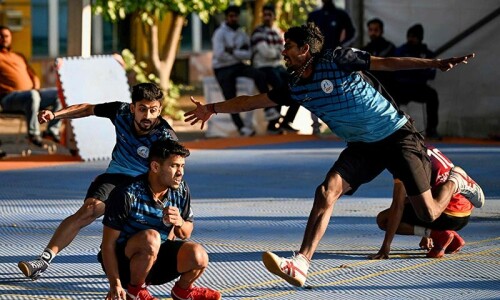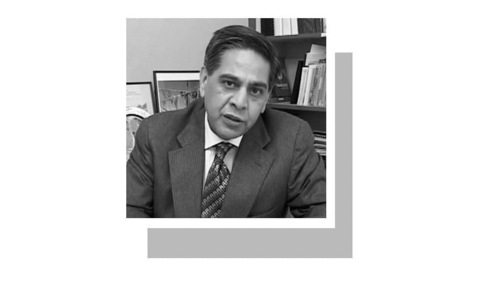
In Pakistan, it was once common for many people to either pick up sophisticated British or everyday American accents to exhibit their preferred strand of social distinction.
This practice continues even today, but it has been gradually overshadowed by many Pakistanis now wanting to demonstrate differentiation by punctuating English, Urdu or other Pakistani languages with words and expressions borrowed from Arabic, rather than adopting Western English accents. What’s more, there is an increasing tendency in many Pakistanis to pronounce these words in the archetypal throaty Arabic accent.
For example, the Urdu word shukriya (thank you) is increasingly being replaced by the Arabic jazakallah (may God reward you). Ironically, shukriya is derived from the Arabic word shukran, even though the roots of the Urdu shukriya can also be found in the Turkish word ükrü.
Another example is the replacement of the once traditional Urdu response Allah ka shukar (thank God) with the Arabic Alhamdulillah which means the same.
If one further investigates this, there is every likelihood that one would eventually be directed towards the the now well-known phenomenon of the ‘Arabicisation’ or ‘Arabisation’ of Pakistani culture. Sometimes the rapid replacement of the traditional Urdu goodbye or farewell, Khuda hafiz, with Allah hafiz is also demonstrated as an example of Arabisation.
Could Pakistani culture’s gradual ‘Arabisation’ finally be reaching a point of unexpected and ironic turnaround?
But, interestingly, there is very little that is Arabic about it. Allah hafiz is not used in any Arab region and neither in other non-Arab Muslim-majority countries. The standard Arabic words meaning farewell are “tawdie”, “wadae” or “wadaei”. The Sanskrit scholar Sumit Paul is correct to point out that Allah hafiz is largely used by South Asian Muslims, i.e., Pakistanis, Indians and Bangladeshis.
Findings of a 2009 study that I conducted suggested that Allah hafiz was first used by an anchor on the state-owned Pakistan Television (PTV) in 1986. The anchor was Salma Baig. The late author and journalist Murtaza Razvi was the source of this information. S. Hamad Ali in an article for the UK’s The Guardian (17 April, 2012) repeats the claim.
Further investigations suggest that, in the late 1990s and early 2000s, various Sunni Muslim evengelical outfits in Pakistan, India and Bangladesh oraganised concentrated campaigns through posters, banners and sermons urging people to replace Khuda hafiz with Allah hafiz.

Khuda Hafiz is Persian for ‘farewell’. It emerged in Persia and spread in areas influenced by medieval Persian culture, including South Asia. But, for long, Persia has also been predominantly Shia.
Therefore, according to Razvi, the switch from Khuda hafiz to Allah hafiz had its roots in the ‘Arabisation’ of Pakistani culture, which also included an anti-Iran and/or anti-Persian bias emanating from Saudi Arabia, which is said to be the main influencer of the aforementioned ‘Arabisation.’ But, again, intriguingly, and as Ali also notes, Allah hafiz is almost entirely a South Asian concoction.
Now, keep this in mind when I next suggest that the Arabisation of Pakistan — no matter how vehemently the conservative Arab monarchies pursued it — has continued to experience a push-back from certain quarters in the country. And these quarters not only include the liberal and/or moderate intelligentsia but also some religious segments.
Allah hafiz is a fusion of traditional/Persianised South Asian Islam — that from the 11th century onwards was largely informed by Sufism and medieval Persian culture — and ‘Arabisation.’ According to the political scientist Christophe Jaffrelot, ever since the complete collapse of Muslim rule in India in the mid-19th century, there has been a tendency among South Asian Muslims to fuse ‘Pesianised Islam’ with the the one championed by Arab regions.
However, Jaffrelot notes, it became vital for various Muslim scholars to retain the identity of South Asian Islam in the face of the rise of Saudi Arabia — from the 1930s onward — and ‘Western modernity’.
Jaffrelot writes that, with the collapse of Muslim rule in India, some ‘Islamic revivalists’ had begun to adopt ideas from the strand of faith that they came into contact with in Arabia. As a response, the 19th century Muslim educationist, Sir Syed Ahmad Khan reinforced the Persianised culture of Indian Muslim rule and fused it with western modernity.
Jaffrelot then adds that the Muslim philosopher and poet Muhammad Iqbal did the same by pulling out Islam’s many symbols and ideas from their Arab context, and universalising them so that they could fit in the context of both South Asian Islamic traditions as well as 20th-century modernity.
In December 1930, Iqbal explained this as a way to ‘remove the stamp of Arab imperialism’ from Islam and open it up to the ‘spirit of modern times’. Jaffrelot writes that when Pakistan was created in 1947, “it did not turn its direction towards Arabia, but towards South Asia’s Mughal past.” This did not go unnoticed by Saudi Arabia.
In 1949, when Pakistan formed a Muslim World Congress, Saudi Arabia did not exhibit any interest. In 1953, when the state sentenced conservative Islamic scholar Abul Ala Maududi to death for inciting riots against the Ahmadiyya, Saudi Arabia broke diplomatic relations with Pakistan.
When Pakistan joined the US-led South Asia Treaty Organisation (Seato) in 1955, Saudi Arabia described the move as “a stab at the heart of Arabs.” The next year, Pakistan accused Saudi Arabia of siding with India. In the early 1960s, Pakistan moved to strengthen relations with non-Arab Muslim countries, especially Iran and Turkey. In response, and to stay relevant in Pakistan, the Saudi monarchy fostered relations with certain religious parties in the country.
However, by the early 1970s, Pakistan eventually found itself in the Saudi orbit. Saudi Arabia’s international political influence had grown manifold after the 1973 oil crisis. On the other hand, Pakistan had failed to keep itself intact after the departure of East Pakistan.
With Saudi aid also came conditions, one of which was Saudi religious and cultural influence. The ‘Arabisation’ process began in earnest from the late 1970s and especially during Pakistan’s involvement in Afghanistan in the 1980s, with the help of massive Saudi and US aid.
Millions of dollars were invested by the Saudi regime in building mosques and madressahs in Pakistan, and also propping up radical pro-Saudi outfits. Saudi Arabia also financed the building of an Islamic university in Islamabad. Also, thousands of Pakistanis were accepted as employees in Saudi Arabia and the UAE.
But one can now tentatively claim that the ‘Arabisation’ process has begun to recede. In the last few years, the Saudi monarchy is attempting to reorient its policies, and the UAE is going all out to present itself as a ‘modern’ and more ‘open-minded’ entity.
Pakistan is again attempting to claim its Persian and Turkic roots. According to anthropologist Alix Philippon, the Islam that emerged in South Asia and was then adopted by Pakistan, was the result of a dialogue between Sufism, Arab strands of the faith and faiths that already existed in the region before Islam’s arrival. It has always been good at absorbing various influences to construct a syncretic whole.
In a role reversal, Philippon believes that with Arab influence absorbed by South Asian Islam, it will be a modern version of the syncretic South Asian Islam that UAE and Saudi Arabia may now look towards to help them reorient their once conservative outlook. Fascinating.
Published in Dawn, EOS, March 8th, 2020














































Dear visitor, the comments section is undergoing an overhaul and will return soon.